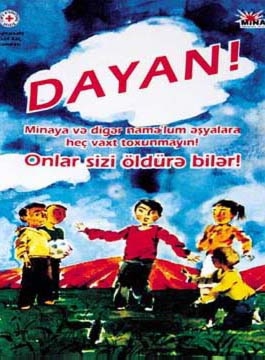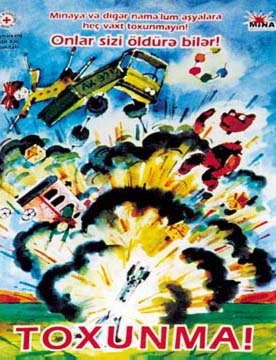|

Spring
2000 (8.1)
Page
34
Ruhangiz Gulmammadova
Office
Administration
  To tell you the truth,
I was shocked when I heard that the alphabet was going to change.
I thought: "Oh my God, what's going to become of us? I'm
too old to start learning a new alphabet. And what's going to
happen to the next generation?" To tell you the truth,
I was shocked when I heard that the alphabet was going to change.
I thought: "Oh my God, what's going to become of us? I'm
too old to start learning a new alphabet. And what's going to
happen to the next generation?"
At that time, all of our books were in the Cyrillic script -
both in the Azeri and Russian languages. So it meant that the
kids who were now learning just the Latin script would not have
access to thousands of Cyrillic books. Yes, we have officially
adopted the Latin script. But so what? It really has not yet
thoroughly penetrated into the everyday fabric of our lives.
For example, we buy newspapers that are mostly written in the
Cyrillic script. But the headlines are in Latin, while the article
itself is in Cyrillic. How absurd! How can today's kids grow
up to be intelligent and knowledgeable if they can only read
the headlines and have to guess what the articles are about?
Russian Track -
Still Stronger
And still the Russian-track education is stronger. One of my
friends is Russian-educated. When it was time to decide which
track to choose for her son's schooling, her family decided that
Azeri would be better than Russian. The family wanted their child
to know Azeri well and to be able to serve his country without
being ashamed of not knowing Azeri properly.
  So the boy went to school.
He was really smart - eager to learn so much. He soon learned
to read and write Azeri Latin, but he wasn't satisfied with the
books offered by the school. He wanted to read literature like
fairy tales and poems. My friend tried so hard to find him children's
books in Azeri Latin, but most books were in Azeri Cyrillic.
She succeeded in finding a few short fairy tales in Latin, but
not enough to satisfy him. In the end, the family gave up and
decided to transfer the boy to the Russian track. Staying in
the Azeri track would have held him back intellectually. So the boy went to school.
He was really smart - eager to learn so much. He soon learned
to read and write Azeri Latin, but he wasn't satisfied with the
books offered by the school. He wanted to read literature like
fairy tales and poems. My friend tried so hard to find him children's
books in Azeri Latin, but most books were in Azeri Cyrillic.
She succeeded in finding a few short fairy tales in Latin, but
not enough to satisfy him. In the end, the family gave up and
decided to transfer the boy to the Russian track. Staying in
the Azeri track would have held him back intellectually.
Slow Progress
For those of us who are used to the Cyrillic alphabet, the process
of changing to Latin has been really slow and initially, very
confusing. For instance, at first we had a letter that looked
like an "a" with two dots (ä), and then suddenly
a decision was made to change it to an "upside-down 'e'"
( ) shape. ) shape.
At my office at the Railway Board of Azerbaijan, we receive documents
from the State Statistics Committee. All of them are in Azeri
Latin. For people of my age and older, it's difficult to read
the Latin script. In our department, I'm the only one who is
somewhat used to it. I can read Latin script because I studied
English and French when I was younger. Sometimes I have to read
a document aloud to the entire staff, which takes a lot of time
and slows down the work flow. My co-workers have all learned
Azeri Latin, but it still takes them a long time to read anything.
Photos: Warnings in Azeri Latin
posted in the boxcar train refugee school at Saatli tell children
to watch out for land mines. The poster campaign is sponsored
by the International Red Cross.
  Russian Speakers Learning Azeri Russian Speakers Learning Azeri
As far as speaking is concerned, I've noticed lately that people
are using more and more Azeri, and that's a good sign. For example,
Azerbaijani families who have been Russian-speaking for several
generations now have a tendency to learn Azeri these days. I
think this is real progress. They understand how important it
is to know one's mother tongue first. Of course, one's native
language must be loved and cherished. I love Azeri deeply despite
the fact that I'm considered to be a Russian speaker.
I always try to speak properly in Azeri, and my Azeri-speaking
friends say that I never mix Russian words into my Azeri. But
this is characteristic of Russian-speaking people who speak Azeri.
We try to avoid mixing Russian words in our speech, while Azeri
speakers do have a tendency to use Russian words in their Azeri
speech.
I've also noticed that store names and names of organizations
are now written in the Latin script. There's a little store near
our house. For a long time, its title was written in Azeri Cyrillic:
"Chorak", meaning "Bread". A couple of weeks
ago, I saw a man changing the title to be Azeri Latin. I thought,
"At last!" Though he could have done it a long time
ago since Latin was adopted several years ago, as we say, "Better
late than never."
This signified a step forward - not backward - and it gives us
hope. But I continue to ask myself: How long will it be before
Latin has completely penetrated our lives?
Ruhangiz
Gulmammadova (born
1937) is the Head of the Statistics Department of the Railway
Board of Azerbaijan. Russian is her mother tongue, and she usually
speaks Russian in her home. She also knows Azeri and a little
French and English. Gulmammadova studied in the Russian track
at school.
From Azerbaijan
International
(8.1) Spring 2000.
© Azerbaijan International 2000. All rights reserved.
Back to On the Street: Alphabet
Viewpoints Index
Back to Index AI 8.1 (Spring
2000)
AI Home |
Magazine
Choice
| Topics
| Store
| Contact
us
|



